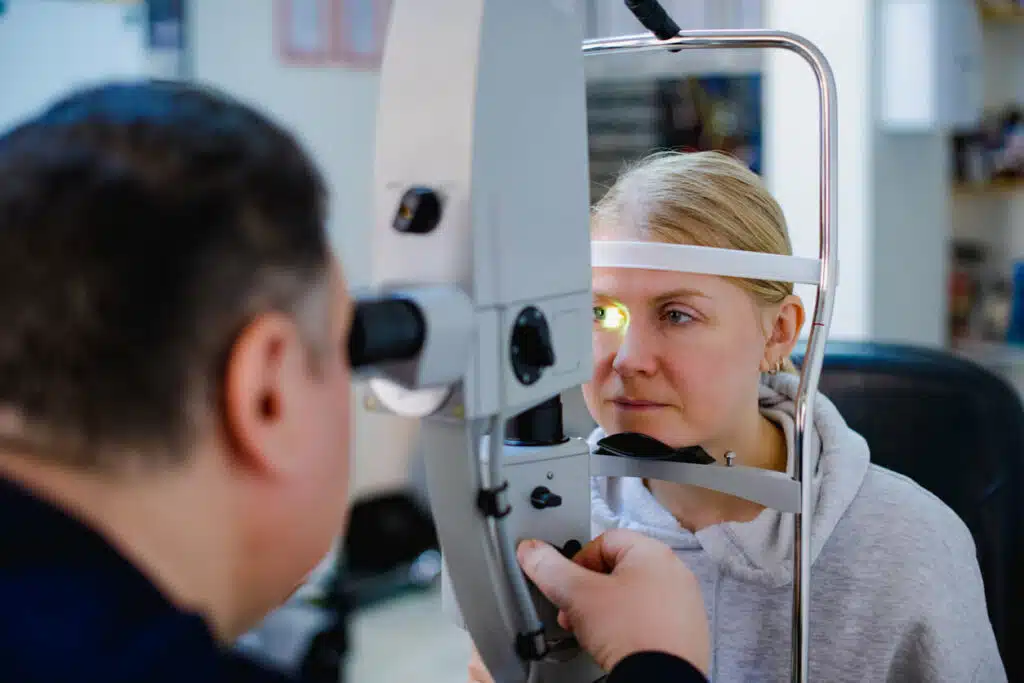
Macular degeneration, the leading cause of severe vision loss in people over age 50, can have devastating consequences for those affected as well as their families. In this blog, we will explore the relationship between macular degeneration, diabetes, and smoking, and discuss how breaking this risk factor chain can preserve the quality of your vision. Armed with this knowledge, you can take steps to maintain good eye health and protect your sight for years to come.
Understanding Macular Degeneration and Diabetes
Macular degeneration, also referred to as age-related macular degeneration (AMD), is a progressive eye disease where the central part of the retina (macula) deteriorates over time. The macula is the part of the eye responsible for sharp and detailed central vision, which enables you to see objects directly in front of you. The condition can lead to gradual vision loss and the advanced form of AMD may eventually result in irreversible blindness and visual impairment.
The two main types of macular degeneration are dry, which accounts for 90% of cases, and wet. While the dry type occurs when the light-sensitive cells in the macula begin to break down, causing gradual loss of central vision, the wet form involves abnormal blood vessel growth under the retina, which can leak fluid or blood, quickly blurring central vision, leading to severe vision loss. Detecting macular degeneration early is the best defense against vision loss.
Diabetes is a chronic medical condition that affects how your body processes sugar (glucose), leading to abnormal blood sugar levels. These high sugar levels can damage blood vessels, including those in the retina, eventually increasing the risk of degenerative eye conditions such as diabetic retinopathy and diabetic macular edema (DME).
The Link Between Diabetes and Macular Degeneration
Diabetes is a known risk factor for developing macular degeneration. High blood sugar levels in people with diabetes can cause the blood vessels at the back inner wall of the eye (the retina) to deteriorate, known as diabetic retinopathy. Diabetic retinopathy happens when tiny bulges (microaneurysms) form in the blood vessels, leaking fluid into the retina. This can lead to complications, such as diabetic macular edema (DME), which is swelling in the macula. DME can result in vision problems or blindness.
Diabetic retinopathy shares some similarities with macular degeneration, since both involve damage to the blood vessels in the retina. In addition to this, studies have shown that people with diabetes are at an increased risk of developing macular degeneration, regardless of whether they have diabetic retinopathy. This highlights the importance of managing diabetes effectively to prevent not only diabetic retinopathy but also macular degeneration.
Smoking: A Key Risk Factor for Macular Degeneration
It’s no secret that smoking is detrimental to overall health, but it is also a primary risk factor for developing macular degeneration, with smokers being up to four times more likely to develop the condition than non-smokers. This increased risk is due to the harmful substances in cigarettes that damage blood vessels throughout the body, including the ones in the retina. Smoking can increase oxidative stress and promote inflammation, reducing blood flow to the retina. This contributes to the development and progression of macular degeneration.
Smoking can also significantly increase the risk of developing diabetes. Smokers have a 30-40% higher probability of developing type 2 diabetes than non-smokers. This increased risk is attributed to the various harmful chemicals in cigarettes that induce inflammation and have a negative impact on insulin action, leading to impaired glucose metabolism.
Breaking the Risk Factor Chain: Preventing Macular Degeneration
The good news is that there are several steps you can take to reduce your risk of developing macular degeneration, particularly if you have diabetes or are a smoker:
1. Manage Your Diabetes
Maintain optimal blood sugar and blood pressure levels by following your doctor’s recommendations for diet, exercise, and medication. Regular visits to an eye care professional, such as a board-certified ophthalmologist, can help in the early detection and treatment of any eye complications.
2. Quit Smoking
Giving up smoking can significantly reduce your risk of macular degeneration. It can also improve your overall health, reducing the risk of heart disease, stroke, lung cancer, and other conditions. If you have diabetes, giving up smoking can also help you better manage your blood sugar levels. To give up smoking, seek support from family, friends, and healthcare professionals. There are also free resources available on the Centers for Disease Control and Prevention (CDC) website to help you.
3. Maintain a Healthy Diet
A well-balanced diet, low in saturated fat, cholesterol, and refined sugars can help manage blood sugar levels and overall health. Include foods rich in antioxidants, such as dark green leafy vegetables and colorful fruits, which can help protect your retinal cells from oxidative stress and reduce your risk of macular degeneration.
4. Exercise Regularly
Regular physical activity is a cornerstone of good health, helping maintain a healthy weight and reduce your risk of developing diabetes, which in turn lowers your risk of macular degeneration. Aim for a minimum of 150 minutes of moderate-intensity aerobic activity per week, combined with muscle-strengthening activities. Always consult your doctor before starting a new exercise routine.
5. Get Regular Eye Exams
Early detection and treatment are crucial to managing diabetes and macular degeneration. Make sure to schedule regular eye exams to monitor for any changes in your vision or eye health. For those with diabetes, it’s recommended to have an annual eye exam with dilation. Those over the age of 50 should also get frequent eye exams to monitor for signs of macular degeneration.
While diabetes and macular degeneration can be daunting conditions, by addressing these risk factors and making healthy lifestyle choices, you can help break the chain and prevent or manage their progression. Investing in your eye health today can have a significant impact on preserving your vision in the future. So prioritize regular check-ups with your eye care professional and take proactive steps to maintain good overall health. Remember, it’s never too late to start making positive changes for a healthier future.
Macular Degeneration and Diabetes Near Me in Washington, Missouri
For comprehensive vision care, including diabetic eye care, visit Advanced Sight Center. Our expert board-certified eye doctors, including ophthalmologists and an optometrist, use innovative diagnostic examinations to detect eye diseases or abnormalities at their earliest stages, when treatment is often most effective.
For more information about macular degeneration or our diabetic eye care services, contact us today at (636) 239-1650, or you can request an appointment online.




